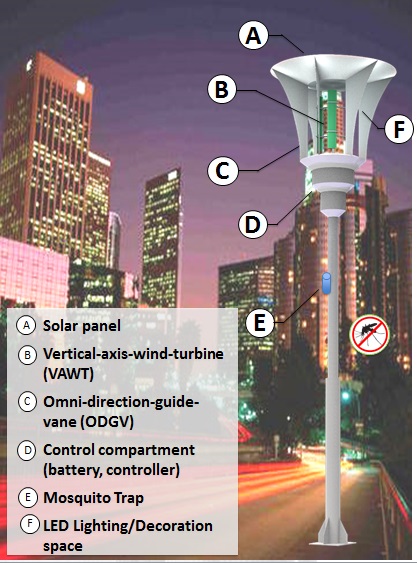A research team headed by Chong Wen Tong from University of Malaysia has developed a hybrid energy LED outdoor light, capable of imitating human scent to trap mosquitos.
To prevent the spread of dengue, a mosquito transmitted disease in Malaysia, Chong, an Associate Professor, Department of Mechanical Engineering Faculty of Engineering at University of Malaysia has developed an outdoor LED light with a built-in mosquito trap that is powered by solar and wind energy systems, according to Asia Research News.
“The mosquito trap takes advantage of the mosquito’s sensory abilities by tricking them with features that mimic the odors associated with humans,” The Guardian report quoted Chong saying.
 |
|
University of Malaysia's hybrid powered LED streetlight can trap mosquitos. (Image Courtesy of Asia Research News) |
Since mosquitos are attracted to UV lights, a weak UV light is integrated into the system, and a suction fan. The UV lights react with titanium dioxide (TiO2) coating on the trap via photo catalytic reaction to create carbon dioxide, which is exhaled by humans. The decoyed mosquitos, are than drawn by the fan to the bottom of the net and are unable to escape, due to the vacuum action created by the fan.
Additionally, to prevent shadowing and optimize energy harvesting the PV panel is located on top of the system, whereas the VAWT is shrouded by the omni-direction-guide-vane (ODGV), a wind power augmentation system that creates venture effect to increase on-coming wind speed.
Since the wiring is placed on top of the lights, it can also be used in flood prone regions.
According to the Guardian report, eight of the streetlights have been installed on the University of Malaya campus and other sites in Malaysian capital Kuala Lumpur as part of a pilot program. The first version of the lights are ready for commercialization, and the research team has signed a license agreement with a private company.
Dengue cases in Malaysia have gone up 19% in 2015, with more than 96,000 reported cases, according to statistics compiled by the World Health Organization (WHO).
There has been an uptick in dengue fever fatalities in 2015 to 282 deaths from the period of January to November compared to 162 fatalities during the same period in 2014, reported Malay Mail.












